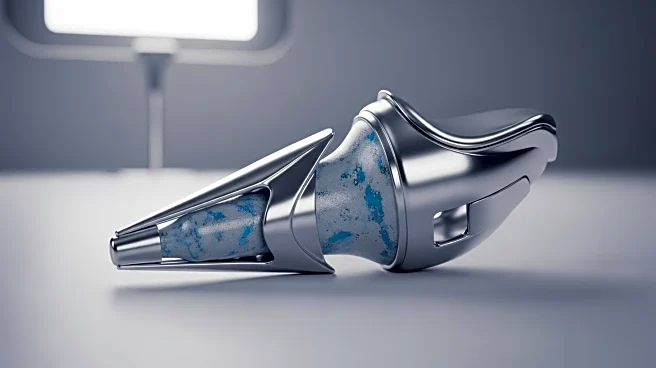What is the story about?
What's Happening?
Zimmer Biomet Holdings, Inc., a leader in medical technology, has announced that the Pharmaceutical and Medical Devices Agency (PMDA) in Japan has approved its iTaperloc Complete and iG7 Hip System. This system is the first of its kind to incorporate Iodine Technology, which inhibits bacterial adhesion and prevents biofilm formation on the implant surface. This innovation addresses the issue of Periprosthetic Joint Infection (PJI), a common and serious complication in total joint arthroplasty. PJI occurs in 1-2% of primary procedures and has a mortality rate comparable to some cancers. The technology was developed by Professor Hiroyuki Tsuchiya and involves a controlled-release iodine layer that prevents bacterial growth during the postoperative period.
Why It's Important?
The approval of this iodine-treated hip replacement system is significant as it represents a major advancement in orthopedic implant technology. By reducing the risk of PJI, the system could improve patient outcomes and reduce the need for revision surgeries, which are costly and complex. This development is particularly important for the healthcare industry as it seeks to enhance surgical safety and efficiency. Zimmer Biomet's innovation could set a new standard in infection management for joint replacements, potentially influencing future designs and regulatory standards in the medical device industry.
What's Next?
With the approval in Japan, Zimmer Biomet is likely to focus on expanding the availability of its iodine-treated hip replacement system to other markets. The company may also continue to develop and refine its infection management solutions, leveraging this technology to address other types of joint replacements. Surgeons and healthcare providers will be key stakeholders in adopting this new technology, and their feedback could drive further innovations. Regulatory bodies in other countries may also evaluate similar technologies, potentially leading to broader international adoption.
Beyond the Headlines
The introduction of iodine-treated implants could have broader implications for the medical field, particularly in how infections are managed in surgical settings. This technology may prompt a reevaluation of current practices and encourage further research into biocompatible materials that prevent infections. Additionally, the success of this innovation could inspire other companies to invest in similar technologies, fostering a competitive environment that accelerates advancements in medical device technology.















